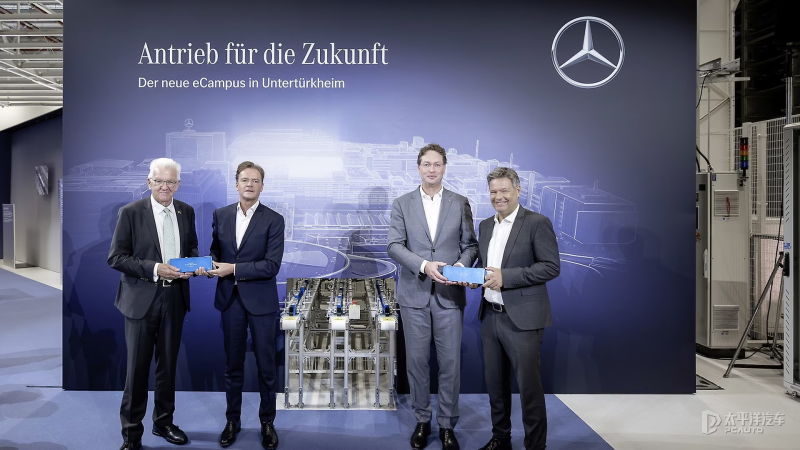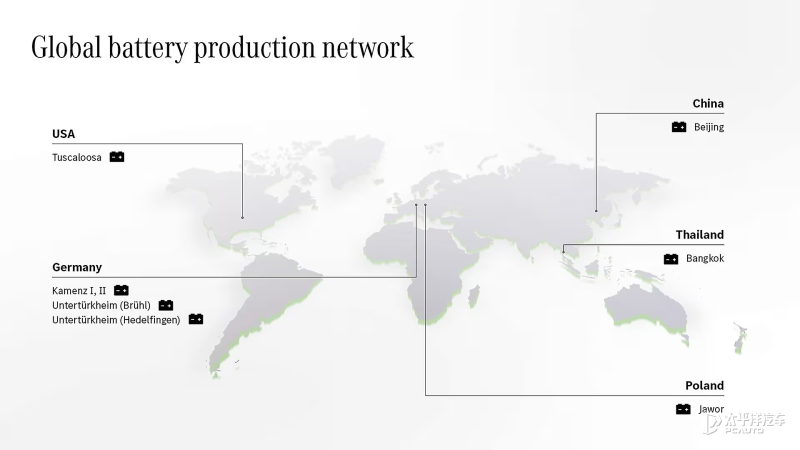Benz will set up a battery research and development center at its headquarters in Germany! The target is to reduce the cost by more than 30%
 AshleyJul 10, 2024, 04:20 PM
AshleyJul 10, 2024, 04:20 PM
On July 9, according to a news release on the Mercedes-Benz official website, the company plans to establish a battery R&D center at its headquarters in Stuttgart, Germany. The goal is to develop high-performance batteries with "Mercedes-Benz DNA" and reduce battery costs by more than 30% in the next few years.
The official news shows that on July 8 local time, Mercedes-Benz held the completion ceremony of the battery R&D and production center "Mercedes-Benz eCampus" at its Stuttgart headquarters. Robert Habeck, the Federal Minister of Economics of Germany, and Winfried Kretschmann, the Prime Minister of Baden-Württemberg, attended the ceremony.

The completion ceremony of the "Mercedes-Benz eCampus"
The center has a factory occupying 10,000 square meters, which plans to produce tens of thousands of cells each year. It also plans to establish a battery testing and experimental center before the end of this year.
The goal is to develop high-performance batteries with "Mercedes-Benz DNA", innovate chemical components and optimize production processes, with the expectation of reducing battery costs by more than 30% over the next few years. Mercedes-Benz is researching lithium-ion batteries with high-energy anodes and cobalt-free cathodes, as well as solid-state technology, which has the potential to achieve more energy storage, longer range, and faster charging speeds.

Global Battery Production Network Diagram
The official news shows that the R&D center will cover all areas of batteries and battery technology. Its scope of work includes the development and evaluation of new battery chemicals, the production of batteries on an industrial scale, testing and certification of complete battery units.
If any infringement occurs, please contact us for deletion
Trending News

Perodua Traz VS Ativa, which one is more worth buying?
Traz, as a newly launched mid-sized SUV, offers more spacious room and mainstream power compared to small SUVs, but its pricing appears slightly higher than that of Ativa. Ativa, on the other hand, is Perodua's long-time best-selling small SUV with more affordable pricing and a balanced combination of power and tech features.

Perodua Myvi and Bezza may undergo major upgrades in 2026
After the update, the Bezza will no longer be just a low-cost alternative but a core model in the Perodua system with greater market competitiveness and brand premium potential. The upgrade of the Myvi is not to be unconventional but to strengthen the brand and market, ensuring that the Myvi continues to maintain its irreplaceable position in the new round of product competition.

Perodua Traz VS Toyota Yaris Cross, where does the Traz fall short?
Before the official launch of the Perodua Traz, market expectations were actually very high because it shares the same DNGA platform as the Toyota Yaris Cross. However, sharing the same platform does not equate to the same experience, and the Traz's final performance has indeed been disappointing. Perhaps it is precisely because of the delayed launch that it has almost no competitiveness in the current competitive environment.

Will the Toyota Yaris Cross come to Malaysia? If it comes, how much will it sell for?
The launch of Perodua Traz indicates that the market size of small SUVs in Malaysia has been expanding in recent years. However, the question naturally shifts back to Toyota. As a brand with the most comprehensive product line and a strong foundation in both the SUV and hybrid sectors, will Toyota choose the Yaris Cross to participate in this small SUV competition?

Why is the Toyota Sienna so popular with so many people?
In Malaysia, most family MPVs choose Toyota Alphard, Vellfire, or Kia Carnival. These models each have their advantages in luxury, space, or brand influence, but models that truly balance large space, multifunctional practicality, fuel efficiency, and reliability are rarely seen.
Popular Cars
Model Year
Car Compare
Car Photo

